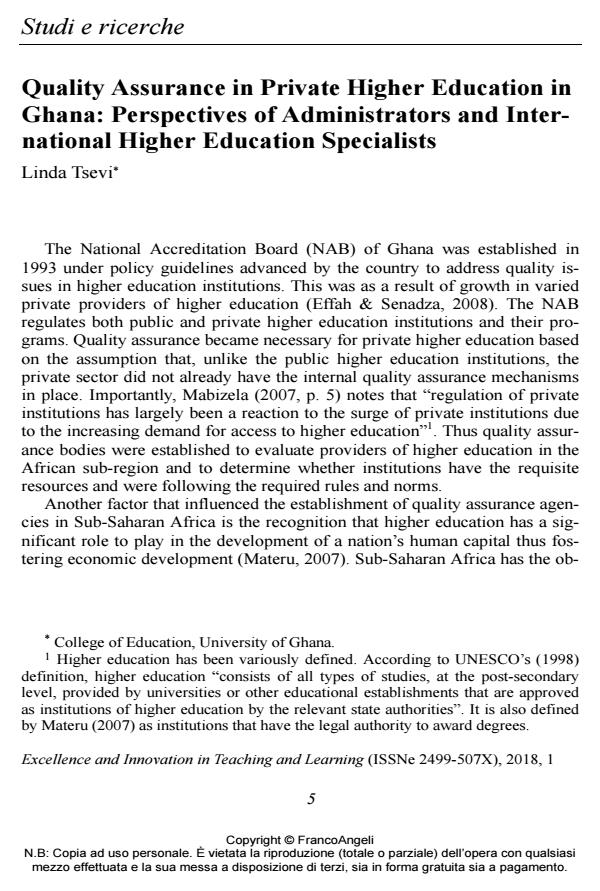Quality Assurance in Private Higher Education in Ghana: Perspectives of Administrators and International Higher Education Specialists
Titolo Rivista EXCELLENCE AND INNOVATION IN LEARNING AND TEACHING
Autori/Curatori Linda Tsevi
Anno di pubblicazione 2018 Fascicolo 2018/1
Lingua Inglese Numero pagine 19 P. 5-23 Dimensione file 181 KB
DOI 10.3280/EXI2018-001001
Il DOI è il codice a barre della proprietà intellettuale: per saperne di più
clicca qui
Qui sotto puoi vedere in anteprima la prima pagina di questo articolo.
Se questo articolo ti interessa, lo puoi acquistare (e scaricare in formato pdf) seguendo le facili indicazioni per acquistare il download credit. Acquista Download Credits per scaricare questo Articolo in formato PDF

FrancoAngeli è membro della Publishers International Linking Association, Inc (PILA)associazione indipendente e non profit per facilitare (attraverso i servizi tecnologici implementati da CrossRef.org) l’accesso degli studiosi ai contenuti digitali nelle pubblicazioni professionali e scientifiche
College of Education, University of Ghana This paper examined private higher education in Ghana and the implementation of quality assurance procedures from the perspectives of administrators and international higher education specialists. Using the three main isomorphic classifications (coercive, mimetic and normative) of DiMaggio and Powell’s (1983) institutional theory, this qualitative study explored how regulatory measures impact the efforts of private providers towards meeting quality assurance standards. Administrators from seven private higher education institutions in Ghana and three international higher education specialists were purposefully selected as sample for this paper. The outcome of the open-ended interviews found evidence of efforts private institutions were making towards meeting their quality assurance requirements through mimetic, coercive and normative isomorphism. These were indicated through institutional affiliations and conformity to mentoring institution’s educational programs among others. However, Ghana’s private higher education landscape has a number of challenges that include mixed perceptions about the quality of educational programs offered that promoted learning, and varied influences on academic programs. These issues would require a holistic approach in order to find long lasting solutions. Further, the continual increase in private providers would require a quality assurance process that would promote genuine actors.
Parole chiave:Quality assurance, institutional theory, private higher education, institutional Affiliations
Linda Tsevi, Quality Assurance in Private Higher Education in Ghana: Perspectives of Administrators and International Higher Education Specialists in "EXCELLENCE AND INNOVATION IN LEARNING AND TEACHING" 1/2018, pp 5-23, DOI: 10.3280/EXI2018-001001